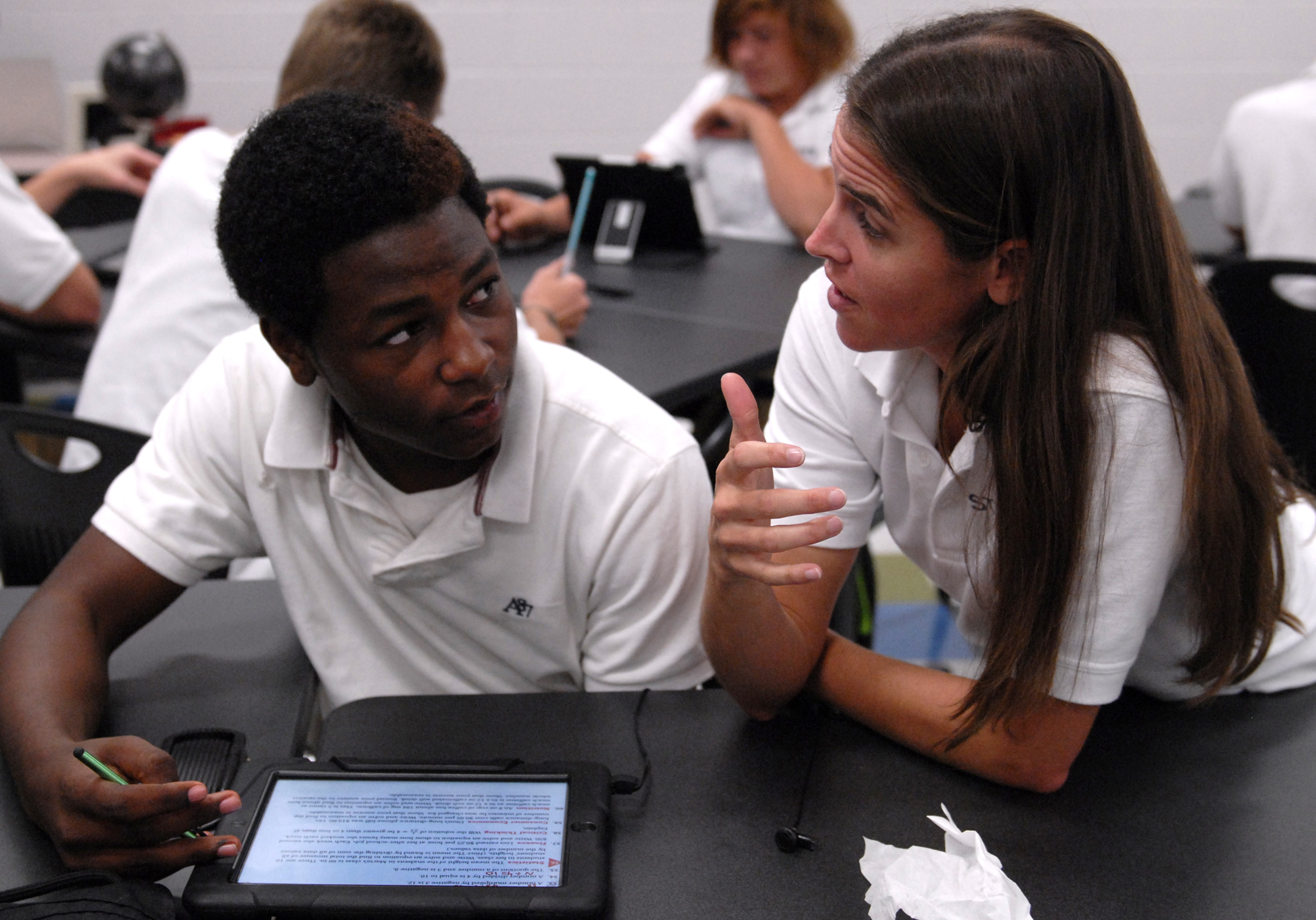 Algebra and geometry teacher Stacy Hill helps Dehavon Johnson with an algebra problem on an iPad at Hamilton County's new STEM school for science, technology, engineering and math on Friday. Teachers and students at the school are transitioning to a totally digital curriculum and use iPads for almost all instruction and classwork.
Algebra and geometry teacher Stacy Hill helps Dehavon Johnson with an algebra problem on an iPad at Hamilton County's new STEM school for science, technology, engineering and math on Friday. Teachers and students at the school are transitioning to a totally digital curriculum and use iPads for almost all instruction and classwork.HOW TO HELPHamilton County's STEM high school is seeking small cash donations from businesses and individuals to help with purchases of technology and supplies. To give, call Principal Tony Donen at 423-531-6270.
There's a rule in Stacy Hill's math classroom: Students can't ask the teacher questions before they have first tried asking another student.
"The goal is for them to learn from each other as much as possible," she said. "It's easy to turn around and ask me a question and for me to give them the answer."
Hill teaches geometry and algebra at Hamilton County's science, technology, engineering and math school, or STEM, which opened about three weeks ago with an inaugural class of 75 ninth-graders.
Since then, students have learned a new way of doing school, using iPads for nearly every task and ditching the paper and pencil ways of their elementary and middle school years. The STEM instruction puts a heavier burden on students, who work together on projects and assignments.
"The students have been trained for at least eight years to do school a certain way," said Allison Fuller-Mulloy, the school's lead teacher. "This is very different, but they're doing really well."
For many lessons, students are required to watch instructional videos or complete readings on their iPads before coming to school. It gives students more control and responsibility over their own education, teachers said, but also allows for more group and project work during class time.
So far it seems to be a hit with students.
"This was a huge jump from paper, rulers, books -- all that stuff," said Bailey Crittenden. "I love it, personally."
She said she enjoys having increased responsibility over her own education, though she noted it is more demanding than traditional schooling.
"I tell people we're basically in college," Bailey said.
Regular assessments determine whether students are placed in basic or more advanced classes, but their placement can change as often as every week. On Fridays, students pick classes and build their schedule for the following week.
"It takes a lot of the administrative part out of it and puts ownership on the students," said Principal Tony Donen.
In class, students take notes, turn in assignments and complete assessments on their iPads. Educational apps allow them to turn in work and receive feedback without ever leaving their desks.
Most students have ditched the hefty backpacks because there are no textbooks or worksheets to lug around. A few students still hang on to a notebook here or there, but most have only an iPad at their fingertips.
Each educational unit will require students to complete a large-scale project and presentation that draws from all subject areas. The first unit requires students to examine ways to stop new virus strains from emerging. Once they've completed presentations on that project, students will move on to the next unit, in which they'll create a plan to mitigate the effects of 100-degree days in Chattanooga.
Donen said the students will write a persuasive paper and complete a case study examining historical heat trends. They'll use algebra and geometry skills to create graphs showing linear relationships between heat and other variables. In art class, they'll work on designing a water park.
Freshman Daejanae Williams said she gets more out of this type of instruction, even though teachers do seem to demand more of students here.
"It's challenging," she said. "But I think the challenge is what's going to make us more successful."